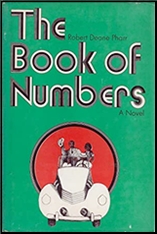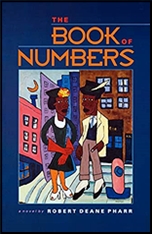Thu 22 Dec 2022
Reviewed by Tony Baer: ROBERT DEANE PHARR – The Book of Numbers.
Posted by Steve under Reviews[2] Comments
ROBERT DEANE PHARR – The Book of Numbers. Doubleday, hardcover, 1969. University of Virginia Press, softcover, 2001.

Dave Greene and Blueboy are Black travelling waiters in the 1930’s, going from resort town to town with the seasons: Saratoga, Hot Springs, wherever the white leisure class goes, you’re sure to find them there. Waiting.
And since segregation is still a thing, there’s a Black ward in every one of these towns. With Black whore houses, bars and gambling to match so that these travelling waiters can spend every cent they earn. All except for Dave Greene. He’s got bigger plans.
Dave’s father was a ‘lawyer’: ‘Lawyer Greene’. He wasn’t a real lawyer — never having gone to law school, never having passed the bar. But he knew more about the law than most of his peers, and he knew enough to represent his clients by genuflecting like a bending slave, ‘yessah’-ing and ‘nossah’-ing and bowing to whitey begging forgiveness and promising to do better from now on.
Dave grew up thinking his dad was an actual lawyer entitled to respect. It was only when he grew older and began to understand that other Black folks in the community viewed ‘Lawyer Greene’ as a pathetic minstrel that Dave began to hate his father and crave actual and deserved respect.
So rather than spending all his travelling waiter money on prostitution, alcohol and craps, Dave saves up. For something. He’s not quite sure what.

But then he and Blueboy wind up in Richmond, VA. And they notice something strange. There’s no local numbers racket. All the locals play numbers by sending money to Detroit or Chicago or some other big town. But there’s nowhere local to play.
The way you play numbers is you pick any number from 000 to 999. And you can bet any amount you want, starting with a penny. And if your number ‘hits’, you win on 600-1 odds. So a penny bet will get you six dollars. And so on.
Dave has saved up $1000. And he’s sick of playing minstrel to whitey. He’s ready for some respect. So he and Blueboy quit being waiters and start a numbers racket in Richmond’s Black ward.
They make it big. Really big. And end up millionaires. In cash. But they aren’t really allowed to spend it any way they want. They try to go legit. To invest in a franchise of some kind. Or a dealership. But Blacks aren’t allowed to own a franchise or dealership in nearly every industry of the time.
And white politicians and law enforcement start expecting bigger and bigger payoffs. And violence in the ward is a thing. A thing you can’t avoid. No matter how big you think you are. Sudden death is never far behind.
It’s a good novel. Didn’t blow me away. But it’s good. And does an excellent (what do I know?) job of showing you what life was like for local numbers bosses in the segregated south of the 30’s. Pharr’s own biography is similar to that of his protagonists — and his actual experiences surely inform the verisimilitude of the story told. The vernacular of the dialogue is fresh and frequently hilarious, with such lines as: ‘he’s too short to kick a duck’s butt’ and ‘don’t look a gift whore in the mouth.’
In an interview Pharr says his goal was to be a Black Sinclair Lewis. He was inspired by Babbitt and getting a glimpse inside the upper middle class white home, to see what life was like behind closed doors, doors heretofore forbidden. Now opened wide. Pharr wished to do the same for Black culture. To let you see what Black folks are like when whites aren’t looking.
The characters are all three-dimensionally drawn, with romance and dreams and heartbreak. While the main characters may be nominally gangsters — they bristle at the accusation. They don’t see themselves that way. They just see themselves as men, and they dream to be treated as such.
Made into a film of the same name in 1973. . Currently online at: https://www.youtube.com/watch?v=hQJAanxjgcQ.
December 22nd, 2022 at 9:58 pm
Missed this somehow, seems like one I ought to look out for. Surprising how often back then a good novel would show up from a University Press or a more offbeat one like Naval Institute.
December 23rd, 2022 at 4:58 am
David,
The back flap of the dust cover says that Pharr, who was waiting tables at a Columbia University banquet, left the manuscript with the chair of the Columbia University English Department. The professor liked it and forwarded the manuscript on from there…